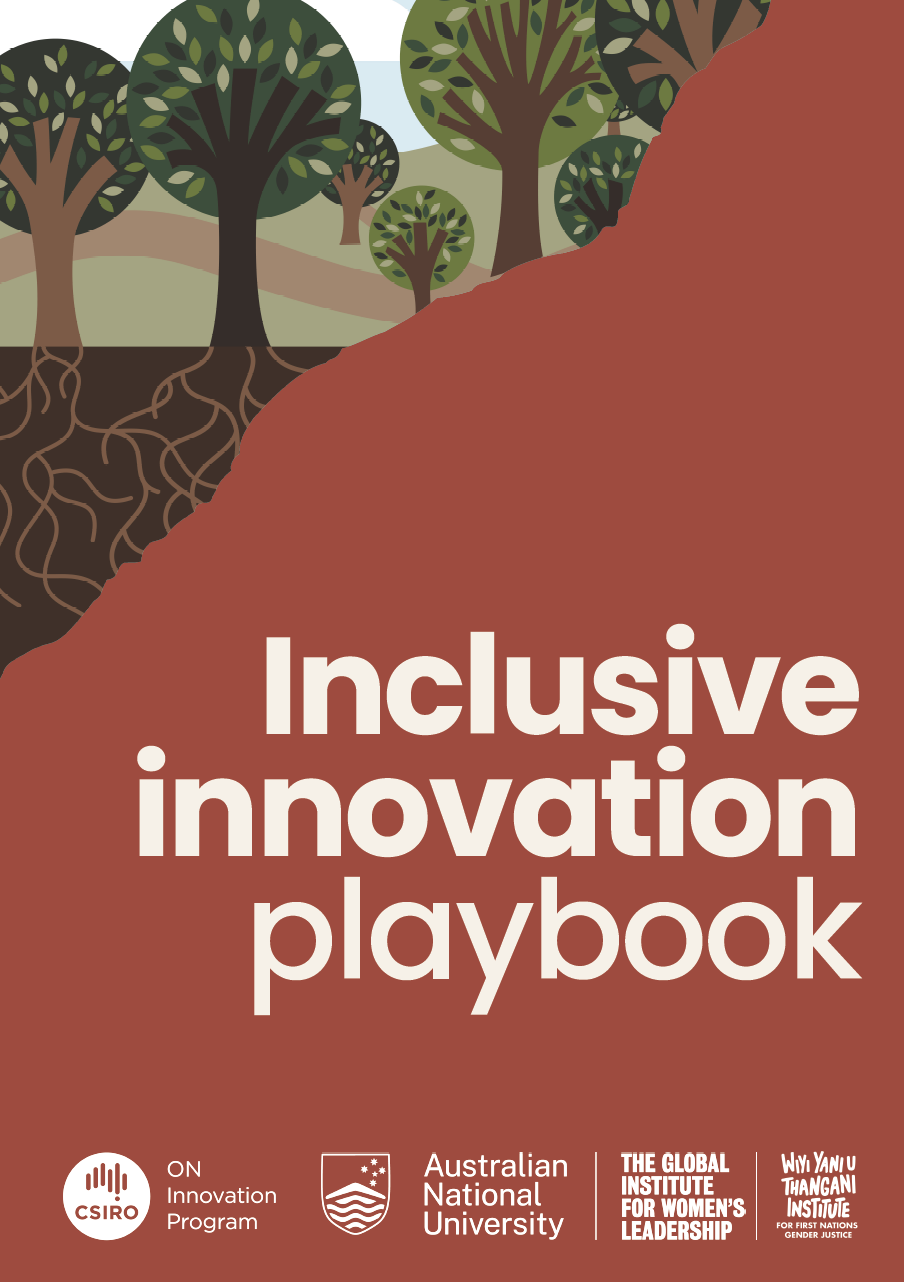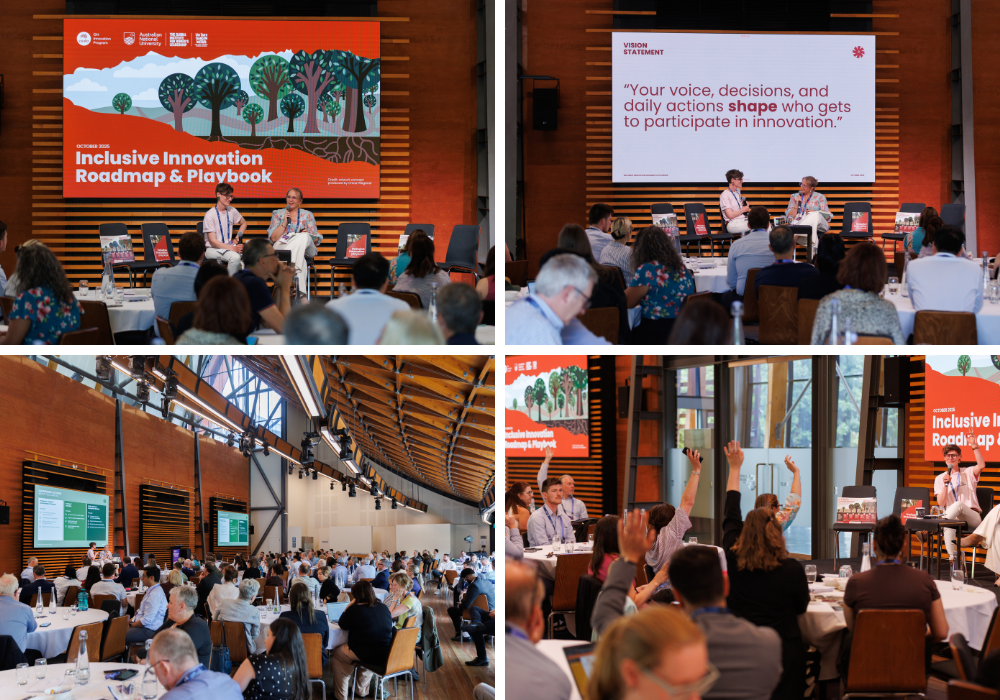Turning big ideas into real-world impact
Overview
Innovation thrives when diverse voices are heard, supported, and empowered. In partnership with the Global Institute for Women's Leadership (GIWL) and the Wiyi Yani U Thangani Institute for First Nations Gender Justice (WYUT) at ANU, CSIRO's ON Innovation Program (ON) set out to explore how inclusive practices can drive better outcomes for researchers, innovators, and the communities they serve.

This project investigated how diversity, equity and inclusion (DEI) can be embedded into innovation ecosystems to ensure that all participants - regardless of background - can contribute meaningfully and benefit equitably from research translation and commercialisation efforts.
About the project
Co-led by GIWL and WYUT in collaboration with ON, the initiative aimed to:
- Identify leverage points and best practices for embedding diversity, equity and inclusion (DEI) across innovation systems
- Develop a strategic framework to guide inclusive design, delivery, and evaluation of innovation programs
- Analyse existing program materials and participant experiences to surface systemic barriers and opportunities for change
Using an evidence-based, mixed-methods approach - including surveys, interviews, and policy analysis - the teams examined how inclusive practices can be scaled and sustained.
The work was grounded in principles of systems thinking, shared leadership, and continuous learning, recognising that meaningful change requires more than isolated interventions.
Why Inclusive Innovation matters
Research shows that inclusive innovation leads to:
- Stronger problem-solving through diverse perspectives
- Greater relevance of solutions to real-world challenges
- Improved collaboration across sectors and communities
- Enhanced commercial outcomes through broader market reach
Yet, barriers remain.
From accessibility and representation to timing and communication, many innovators face systemic challenges that limit their participation and impact.
Key focus areas
The team examined:
- Accessibility: are spaces, materials, and schedules inclusive?
- Communication: are messages reaching diverse audiences effectively?
- Cohort diversity: who is participating - and who is missing?
- Policy and leadership: are DEI values reflected in practice?
- Responsiveness: how well do programs adapt to participant needs?
Consolidated key findings
What we learned:
- Representation matters: diverse facilitators and mentors foster trust and psychological safety.
- Program design needs flexibility: rigid structures can exclude participants with caring responsibilities and neurodivergent needs.
- Cultural safety is critical: First Nations innovators require tailored, respectful engagement aligned with cultural protocols.
- Support and care gaps: women report dissatisfaction with leave and care policies, highlighting systemic inequities.
- Feedback mechanisms lacking: clear, safe, and transparent complaint channels are essential for accountability.
Why it matters:
Programs that actively support DEI see stronger engagement and retention. Inclusive design leads to more innovative, socially relevant outcomes. Participants value cultural safety, flexibility, and visible leadership commitment as core enablers of success. Inclusive teams are:
- 10x more innovative
- 8x more likely to collaborate effectively
- 6x more likely to report positive mental health
These insights will inform a best-practice DEI strategy for ON and other innovation programs across Australia.
What's next
Inclusive innovation is not a one-off initiative - it's a long-term commitment to transforming how Australia's innovation ecosystem operates. Building on the findings from this project, we've created tools and recommendations to help partners across the system embed inclusive practices and sustain progress.
This includes:
- Inclusive recruitment and leadership development across programs and institutions
- Flexible program design that accommodates diverse needs, including caring responsibilities and neurodivergence
- DEI training and capability-building for staff, mentors, and decision-makers
- Structural redesign to remove systemic barriers and foster cultural safety
- Improved data systems to support transparency, accountability, and continuous learning
Because diversity matters at every stage of the innovation journey, from who's in the room to how ideas are shaped; we're working to ensure inclusion is built into the foundations of how innovation is funded, supported, and scaled.
This is about more than just one program. It's about shifting the system—so inclusive innovation becomes standard practice, not the exception.

Download the roadmap and playbook
- Inclusive innovation playbook
- Inclusive innovation playbook - accessible text only
- Inclusive innovation roadmap - for Australia’s innovation ecosystem
- Inclusive innovation roadmap - for Innovators: researchers, entrepreneurs and startups
- Inclusive innovation roadmap - for Programs: incubators, accelerator and innovation hubs
- Inclusive innovation roadmap - for Funders: VCs, angels, philanthropists and government
We welcome feedback, collaboration, and participation in future evaluations. Help us shape a more inclusive innovation future.
Contact us via ON@csiro.au
Turning big ideas into real-world impact
Overview
Innovation thrives when diverse voices are heard, supported, and empowered. In partnership with the Global Institute for Women's Leadership (GIWL) and the Wiyi Yani U Thangani Institute for First Nations Gender Justice (WYUT) at ANU, CSIRO's ON Innovation Program (ON) set out to explore how inclusive practices can drive better outcomes for researchers, innovators, and the communities they serve.
This project investigated how diversity, equity and inclusion (DEI) can be embedded into innovation ecosystems to ensure that all participants - regardless of background - can contribute meaningfully and benefit equitably from research translation and commercialisation efforts.
About the project
Co-led by GIWL and WYUT in collaboration with ON, the initiative aimed to:
- Identify leverage points and best practices for embedding diversity, equity and inclusion (DEI) across innovation systems
- Develop a strategic framework to guide inclusive design, delivery, and evaluation of innovation programs
- Analyse existing program materials and participant experiences to surface systemic barriers and opportunities for change
Using an evidence-based, mixed-methods approach - including surveys, interviews, and policy analysis - the teams examined how inclusive practices can be scaled and sustained.
The work was grounded in principles of systems thinking, shared leadership, and continuous learning, recognising that meaningful change requires more than isolated interventions.
Why Inclusive Innovation matters
Research shows that inclusive innovation leads to:
- Stronger problem-solving through diverse perspectives
- Greater relevance of solutions to real-world challenges
- Improved collaboration across sectors and communities
- Enhanced commercial outcomes through broader market reach
Yet, barriers remain.
From accessibility and representation to timing and communication, many innovators face systemic challenges that limit their participation and impact.
Key focus areas
The team examined:
- Accessibility: are spaces, materials, and schedules inclusive?
- Communication: are messages reaching diverse audiences effectively?
- Cohort diversity: who is participating - and who is missing?
- Policy and leadership: are DEI values reflected in practice?
- Responsiveness: how well do programs adapt to participant needs?
Consolidated key findings
What we learned:
- Representation matters: diverse facilitators and mentors foster trust and psychological safety.
- Program design needs flexibility: rigid structures can exclude participants with caring responsibilities and neurodivergent needs.
- Cultural safety is critical: First Nations innovators require tailored, respectful engagement aligned with cultural protocols.
- Support and care gaps: women report dissatisfaction with leave and care policies, highlighting systemic inequities.
- Feedback mechanisms lacking: clear, safe, and transparent complaint channels are essential for accountability.
Why it matters:
Programs that actively support DEI see stronger engagement and retention. Inclusive design leads to more innovative, socially relevant outcomes. Participants value cultural safety, flexibility, and visible leadership commitment as core enablers of success. Inclusive teams are:
- 10x more innovative
- 8x more likely to collaborate effectively
- 6x more likely to report positive mental health
These insights will inform a best-practice DEI strategy for ON and other innovation programs across Australia.
What's next
Inclusive innovation is not a one-off initiative - it's a long-term commitment to transforming how Australia's innovation ecosystem operates. Building on the findings from this project, we've created tools and recommendations to help partners across the system embed inclusive practices and sustain progress.
This includes:
- Inclusive recruitment and leadership development across programs and institutions
- Flexible program design that accommodates diverse needs, including caring responsibilities and neurodivergence
- DEI training and capability-building for staff, mentors, and decision-makers
- Structural redesign to remove systemic barriers and foster cultural safety
- Improved data systems to support transparency, accountability, and continuous learning
Because diversity matters at every stage of the innovation journey, from who's in the room to how ideas are shaped; we're working to ensure inclusion is built into the foundations of how innovation is funded, supported, and scaled.
This is about more than just one program. It's about shifting the system—so inclusive innovation becomes standard practice, not the exception.
Download the roadmap and playbook
- Inclusive innovation playbook PDF (7 MB)
- Inclusive innovation playbook - accessible text only TXT (113 KB)
- Inclusive innovation roadmap - for Australia’s innovation ecosystem PDF (6 MB)
- Inclusive innovation roadmap - for Innovators: researchers, entrepreneurs and startups PDF (6 MB)
- Inclusive innovation roadmap - for Programs: incubators, accelerator and innovation hubs PDF (6 MB)
- Inclusive innovation roadmap - for Funders: VCs, angels, philanthropists and government PDF (6 MB)
We welcome feedback, collaboration, and participation in future evaluations. Help us shape a more inclusive innovation future.
Contact us via ON@csiro.au
